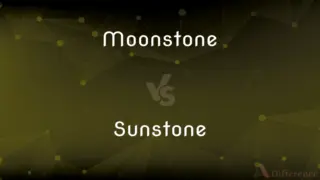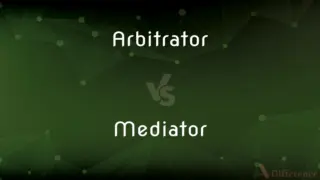Bonfire vs. Campfire — What's the Difference?
By Tayyaba Rehman & Urooj Arif — Updated on May 3, 2024
Bonfires are large, ceremonial fires often used for events, while campfires are smaller, recreational fires typically used in camping settings.

Difference Between Bonfire and Campfire
Table of Contents
ADVERTISEMENT
Key Differences
Bonfires are typically built to be large and are used for significant ceremonial or celebrational purposes, often visible from a great distance. Campfires, on the other hand, are smaller, created for warmth, cooking, or a cozy gathering during camping trips.
The construction of a bonfire involves stacking wood and combustible materials in a structured manner to ensure a large and lasting fire, ideal for events like festivals or large gatherings. Whereas, campfires require less fuel and are generally constructed with a focus on control and sustainability for use over several hours.
Bonfires are usually part of community celebrations, such as on Bonfire Night or at beach parties, symbolizing larger social or ritual events. Conversely, campfires are often more intimate, used among small groups or family settings in the wilderness.
Due to their size, bonfires are not typically suitable for cooking, as they produce intense heat over a large area. In contrast, campfires are ideal for cooking, with their moderate flames allowing for the preparation of food over direct or indirect heat.
Safety precautions for bonfires include maintaining a clear area free of any flammable materials over a wider radius due to the larger size and higher heat output, while campfires require careful monitoring and containment to prevent forest fires and maintain safety.
ADVERTISEMENT
Comparison Chart
Size
Large
Small to medium
Purpose
Ceremonial, large gatherings
Recreation, cooking, warmth
Typical Setting
Open spaces, festivals
Camping sites, outdoor trips
Heat Intensity
High, not suitable for cooking
Moderate, suitable for cooking
Safety Considerations
Large clear area needed, high caution
Smaller area, moderate caution
Compare with Definitions
Bonfire
A large, controlled fire used in signals or as part of events.
The signal bonfire was seen miles away.
Campfire
A symbol of camping and outdoor activities, often depicted in stories of adventure and bonding.
The campfire was the heart of their camping experience.
Bonfire
A fire of substantial size that can be used to dispose of large quantities of waste wood.
After the clean-up, they burned the debris in a bonfire.
Campfire
A small, controlled fire set up in a camp or wilderness area for warmth or cooking.
They gathered around the campfire to share stories.
Bonfire
Symbolic fire, often representing purification or celebration.
They lit a bonfire to symbolize the community's resilience.
Campfire
An outdoor fire that enhances the camping atmosphere and provides light.
The soft glow of the campfire created a magical evening.
Bonfire
A fire built outdoors, usually as part of a celebration or festival.
The bonfire on the beach lit up the night sky.
Campfire
A small, manageable fire that can be used to teach fire safety to scouts and campers.
The scouts learned to start and extinguish a campfire safely.
Bonfire
A large outdoor fire used for ceremonial purposes.
The villagers gathered around the bonfire to celebrate the autumn harvest.
Campfire
A fire used by campers to cook food and provide heat.
He cooked the fish over the campfire.
Bonfire
A bonfire is a large and controlled outdoor fire, used either for informal disposal of burnable waste material or as part of a celebration.
Campfire
A campfire is a fire at a campsite that provides light and warmth, and heat for cooking. It can also serve as a beacon, and an insect and predator deterrent.
Bonfire
A large fire built outdoors, as for signaling or in celebration of an event.
Campfire
An open-air fire in a camp, used for cooking and as a focal point for social activity
After cooking, we sat around a campfire swapping stories
Campfire songs
Bonfire
A large, controlled outdoor fire lit to celebrate something or as a signal.
Campfire
An outdoor fire in a camp, used for cooking or warmth
Sat around the campfire, telling scary stories.
Bonfire
A fire lit outdoors to burn unwanted items; originally (historical), heretics or other offenders, or banned books; now, generally agricultural or garden waste, or rubbish.
Campfire
A meeting held around such a fire.
Bonfire
(figuratively) Something like a bonfire (sense 1 or 2) in heat, destructiveness, ferocity, etc.
Campfire
A fire at a campground or on a camping trip, often used for cooking, to provide light and heat, to drive away bugs, and as a focal point for sitting around in the evening and talking, telling stories, and singing.
Bonfire
(obsolete) A fire lit to cremate a dead body; a funeral pyre.
Campfire
A small outdoor fire for warmth or cooking (as at a camp)
Bonfire
(transitive)
Bonfire
To destroy (something) by, or as if by, burning on a bonfire; (more generally) to burn or set alight.
Bonfire
(ceramics) To fire (pottery) using a bonfire.
Bonfire
(obsolete) To start a bonfire in (a place); to light up (a place) with a bonfire.
Bonfire
To make, or celebrate around, a bonfire.
Bonfire
A large fire built in the open air, as an expression of public joy and exultation, or for amusement.
Full soon by bonfire and by bell,We learnt our liege was passing well.
Bonfire
A large outdoor fire
Common Curiosities
What is the main purpose of a bonfire?
Bonfires are primarily used for large-scale ceremonies and celebrations.
Can you cook food on a bonfire?
Due to the intense heat and large flames, cooking on a bonfire is not advisable.
What makes a campfire ideal for camping?
A campfire provides essential warmth and can be used for cooking, making it ideal for camping.
What is the cultural significance of bonfires?
In many cultures, bonfires are significant in celebrations, symbolizing purification or social unity.
How are campfires typically used?
Campfires are used for warmth, cooking, and as a cozy, communal gathering point during camping.
How do you safely build a bonfire?
Building a bonfire requires selecting a safe location, using appropriate materials, and ensuring it is fully extinguished afterward.
How do campfires enhance the camping experience?
Campfires enhance camping by providing light, warmth, and a focal point for social interaction.
What type of wood is best for a campfire?
Dry, untreated wood is best for campfires to ensure efficient burning and minimal smoke.
Where are bonfires typically built?
Bonfires are built in large, open spaces suitable for large gatherings.
What safety precautions are necessary for campfires?
Campfires require careful monitoring, proper extinguishing, and adherence to local fire regulations.
How does one extinguish a campfire safely?
Extinguishing a campfire involves dousing it with water, stirring the ashes, and checking for remaining heat.
Are bonfires legal everywhere?
The legality of bonfires depends on local laws, including fire safety regulations and environmental considerations.
How can one ensure a campfire is environmentally friendly?
Using local wood and ensuring the fire is completely extinguished can minimize environmental impact.
What is a key safety concern with bonfires?
Due to their size, ensuring that bonfires are built away from flammable materials and controlled is a key safety concern.
Can bonfires be used for emergency signals?
Yes, due to their visibility, bonfires can be effective emergency signals.
Share Your Discovery

Previous Comparison
Moonstone vs. Sunstone
Next Comparison
Arbitrator vs. MediatorAuthor Spotlight
Written by
Tayyaba RehmanTayyaba Rehman is a distinguished writer, currently serving as a primary contributor to askdifference.com. As a researcher in semantics and etymology, Tayyaba's passion for the complexity of languages and their distinctions has found a perfect home on the platform. Tayyaba delves into the intricacies of language, distinguishing between commonly confused words and phrases, thereby providing clarity for readers worldwide.
Co-written by
Urooj ArifUrooj is a skilled content writer at Ask Difference, known for her exceptional ability to simplify complex topics into engaging and informative content. With a passion for research and a flair for clear, concise writing, she consistently delivers articles that resonate with our diverse audience.












































